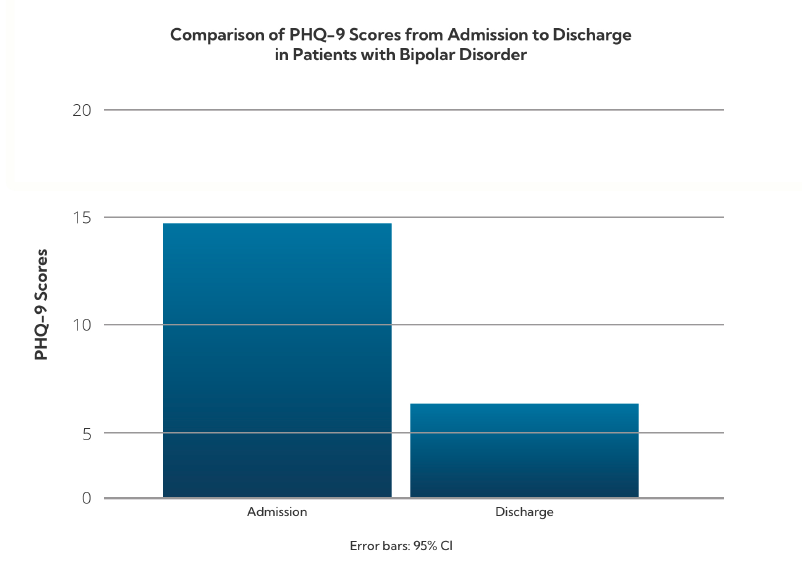Are Severe Mood Swings Disrupting Your Life? Bipolar Disorder May Be the Cause.
Life has its ups and downs, so it’s natural that our moods will vary. Sometimes we feel on top of the world; other times, we’re sad, lonely and discouraged. It’s all part of dealing with the challenges and changes life hands us every day.
But some people deal with mood swings so dramatic that they tend to disrupt every aspect of their lives, from careers to relationships. These extreme highs and lows can be caused by an organic brain condition known as bipolar disorder.
If you or someone you know suffers from mood swings that seem impossible to control, it’s time to learn more about bipolar disorder. The good news is that this condition can be successfully treated. Millions of people with bipolar disorder have found the resources and support they need to control their moods and live in good health.
IMPORTANT: Mood disorders can cause extreme emotional distress. If you are having thoughts of suicide, call 911 now or go to the nearest emergency room.
Video: Mood Disorders Are Often Manifestations of Trauma
Dr. Marcia Nickow, PSY.D., CADC, CGP, Clinical Director and Organizational Advisor at SunCloud Health on how mood disorders are often manifestations of trauma.
What Is Bipolar Disorder?
Bipolar disorder – formerly called manic depression – is a mental health condition that causes emotional highs and lows. For people who live with bipolar disorder, everyday life can become a roller coaster that is difficult to manage without the right support and treatment.
Below are some of the signs and symptoms that people with bipolar disorder regularly deal with. How many of these describe you or your loved one?
- Feeling sad and hopeless for long periods, losing all interest in the things you usually love to do. You may find yourself unable to get out of bed, go to work or even get up to shower or eat.
- Feeling exhilarated and powerful at other times, believing you can do virtually anything. Experts use the term mania to describe this elevated mood state. During manic periods you may sleep very little, finding it easy to work or socialize around the clock. You may also have outbursts of anger and frustration when things don’t go your way.
- High and low moods may last for days, weeks or even months, often alternating with calm periods when you have no symptoms at all.
- During mood-stable times, you may be surprised to see the damage that has been done when you were feeling depressed or manic. For example, you may have lost friendships because you stayed in the house for weeks. Or you may have maxed out your credit cards in a manic spending spree.
- You may not know when the next mood swing is coming. Changes in mood can be unpredictable, although you may already know some of the triggers. For example, many people with bipolar disorder find that when they don’t get enough sleep, they risk having a mood shift.

A Closer Look at Bipolar Disorder: Types I And II
Bipolar disorder is a lifelong condition. But that doesn’t mean you have to suffer the painful effects of uncontrolled mood swings. A treatment plan that brings together the right medications with healthy habits and caring support will empower you to live your best life.
The first step is knowing more about bipolar disorder and the specific type you or your loved one may have.
People with bipolar I disorder have experienced at least one manic episode that may have come before or after a depressive episode. In some cases, the mania may create a break from reality, known as psychosis.
Those with bipolar II disorder have had at least one major depressive episode and at least one hypomanic episode, but have never had a full-on manic episode. Hypomania is the state of feeling happier, more confident and energetic than normal, but without the extreme highs and behaviors of mania.
In some cases, symptoms caused by drugs and alcohol can resemble bipolar disorder. Medical conditions such as Cushing’s disease, multiple sclerosis or stroke can also produce behaviors or symptoms that resemble bipolar disorder. This is why we recommend that you work with a mental health expert to determine the right diagnosis.
It’s important to know that bipolar II isn’t a milder form of bipolar I, but in fact a different diagnosis. While the extreme highs of bipolar I can be troubling and dangerous, people who suffer from bipolar II disorder can be depressed for very long periods, blocking their enjoyment of life and causing serious problems with friends, family and careers.
Both forms of bipolar disorder can appear at any age, but most people are diagnosed in their late teens to mid-20s. Symptoms often vary widely from person to person and may vary a great deal over time.
Understanding Bipolar Mood Swings
Mania and hypomania are two different mood states that people with bipolar disorder will experience at least once in their lives. Mania is much more severe than hypomania, causing bigger issues at work, school and home. It may also trigger a break from reality – an experience known as psychosis – which often requires hospitalization.
- Feeling unusually upbeat, jumpy or “wired”
- High level of activity and energy
- Exaggerated sense of well-being and self-confidence, sometimes called euphoria
- Decreased need for sleep
- Talking more and faster than usual
- Racing thoughts
- Distractibility
- Poor decision-making that can lead to buying sprees, thrill-seeking, risky sexual behaviors and other dangerous choices
People with bipolar disorder will also experience one or more episodes of major depression in their lives. This low mood state brings on symptoms that are severe enough to disrupt daily living, making it hard for sufferers to work, attend school or relate well to others.
- Feeling unusually sad, empty, hopeless or tearful
- Intense irritability, especially in children or teens
- Loss of interest in daily life, even activities you once loved to do
- Losing or gaining weight without trying – or in children, failure to gain weight as expected
- Sleeping too much or too little
- Slower pace or unusual restlessness
- Fatigue, loss of usual energy level
- Feelings of worthlessness
- Excessive guilt and expressions of shame
- Decreased ability to think, concentrate and make decisions
- Thoughts or plans of suicide, or suicide attempts
Other signs and symptoms of bipolar disorder may include anxious distress, melancholy or psychosis (a sharp break from reality). The patterns that medical caregivers see in your symptoms may lead to a diagnosis of mixed-state bipolar disorder or rapid-cycling bipolar disorder.
Over time, you and your care team may notice that seasonal changes or shifts in hormonal patterns (such as the changes women experience with pregnancy) affect the pattern of your symptoms. All of these factors will be taken into account in creating a treatment plan that will work for you.

Find stability and healing. Start today.
Find Compassionate, effective help now.
Bipolar Disorder in Children and Teens
Symptoms of bipolar disorder can be difficult to pinpoint in young people. It can be hard to tell whether they are dealing with age-appropriate mood swings that all children and teens experience. Symptoms may also reflect stress, trauma or a mental health problem that is entirely different from bipolar disorder.
Young people may go through the exaggerated mood states that adults with bipolar disorder also have, but the pattern is often quite different. Moods may shift more rapidly. Some children have periods with no symptoms between episodes, and others experience volatile mood shifts within a single day.
The most prominent signs of bipolar disorder in children and teenagers may include severe mood swings that seem much deeper than usual. These shifts may not track with the pressures the young person is actually facing, or they may show up as an exaggerated response to life challenges. Getting professional help is the best way to determine whether your child may suffer from bipolar disorder.
We’re here to guide you. Reach out now.
Find Compassionate, effective help now.
Why So Many People Overlook the Symptoms of Bipolar Disorder
Even with all the problems they face, people with bipolar disorder often don’t recognize just how much the condition disrupts their lives. They may minimize or overlook the impact on family, friends and employers. As a result, they often don’t seek out the treatment they need to recover.
There are many reasons you may feel tempted to skip treatment. You may enjoy the feelings of euphoria you experience when you’re manic. But the high is always followed by a crash that leaves you depressed and worn out – and often facing financial, legal or relationship trouble too.
On the flip side, you may be so depressed that you can’t see what’s happening to your career and relationships. It’s hard to develop a clear perspective when you’re not feeling like yourself.
Keep in mind that bipolar disorder doesn’t get better on its own. You will need professional help to create a personalized plan to control mood swings with minimum side effects. It takes time – but the rewards include a healthy, productive life without the pain and struggles you’ve been experiencing.
Video: Why SunCloud Health?
Hear from Kim Dennis, MD, CEDS, on why SunCloud Health can be the right treatment program for you or a loved one.
IMPORTANT: If you are feeling so down that you are having thoughts of suicide, don’t wait. Call 911 now or go to the nearest emergency room for treatment.
Let us help you find balance. Contact us today.
Find Compassionate, effective help now.
Bipolar Disorder Can Be Successfully Treated
If you suspect that you or someone you love is dealing with bipolar disorder, the first thing to realize is that you’re not alone. Millions of others are walking the same road. And the experts at SunCloud Health have the tools and knowledge to help you create a plan for mood stability and wellness.
Regardless of the struggles you’ve had in the past, you don’t have to feel ashamed about where you are right now. We understand what you’re going through, because we have helped hundreds of people in Chicago and the surrounding suburbs find their way.
The skilled, caring team at SCH will help you every step of the way, creating a wellness plan that takes into account all the things that make you unique. We will be there to support you in creating a live of health, happiness and purpose – a life that is not defined by bipolar disorder.

Video: We Do Not Ignore the Co-Occurring at SunCloud Health
Dr. Kim Dennis, MD, CEDS, explains how SunCloud Health treats co-occurring disorders.
Here are some things that will ease your mind, even before you begin treatment.
You don’t have to blame yourself. Research shows that bipolar disorder often runs in families. And even though you may feel embarrassed about it, remember that bipolar disorder isn’t a character defect you can correct by trying harder. It’s an organic condition that requires professional treatment, just like diabetes or heart disease.
You’ve already taken the first step. By searching for information on our website, you’ve shown that you are ready to seek help, or support a friend or family member. This is the crucial first step in getting well.
We can make the journey easier for you. The SunCloud staff will use evidence-based techniques and therapies to help you and your family. We will stay with you, providing the education and support you need to manage your symptoms and remain healthy over the long term. We are here to answer your questions, so get in touch with us today.
Life After Bipolar Disorder Treatment?
As an outpatient and residential treatment center, SunCloud Health is in an ideal position to support you for as long as you agree our services are useful to you. With multiple levels of outpatient care, you may decide to stay connected through one of our aftercare outpatient groups – or you may want to continue seeing one of our individual therapists. We are here to provide continuous, caring support for your recovery journey.
Though we understand fully that you don’t want to spend your life in treatment, we also know from experience that a lifetime commitment to wellness is the foundation of your well-being over the long term. We will work with you to maintain a healthy outlook, which means achieving balance, honesty, and health — physical, emotional and spiritual. Our goal is to create a care plan that you can take with you forever, wherever you may go.

Hope and healing are possible. Begin today.
Find Compassionate, effective help now.
Video: Is There Hope for My Recovery?
Dr. Marcia Nickow, Psy.D., CADC, CGP shares her thoughts on hope for recovery at SunCloud Health.
Start your journey to stability. Reach out today.
Living with depression and anxiety my entire life has been plain and simply just terrible. I have been on a merry go round of medication for decades and I have been diagnosed with just about every “mood disorder” out there. Often, I would turn to some form of self-destructive behavior as a way to deal with my pain and despair, and until recently I felt like this was just the way it was going to be forever. When I came to see Dr. Kim, I felt like I had met the “Dr. House” of Psychiatry (great TV series!). She actually spent countless hours in therapy with me and my family properly diagnosing me for the first time in my life and getting my medication finally on the right track. She is anything but a typical psychiatrist who spends maybe 10 minutes with patients and then runs out. The experience at SunCloud helped me see that, with ongoing support, I can actually live a normal and stable life.
SCH patient
Get Help Now
Thinking about seeking help or know someone who does? Click below to have one of our professional team members contact you.
Explaining SunCloud’s Integrated ModelWhy is an integrated treatment model essential to successfully treating patients?
Dr. Kim Dennis, Co-Founder and Medical Director at SunCloud Health, discusses the vital role the integrated model (that she is pioneering at SunCloud Health) plays in the success of treating patients with co-occurring disorders and underlying trauma. How does SunCloud create an authentic culture of patient support?








